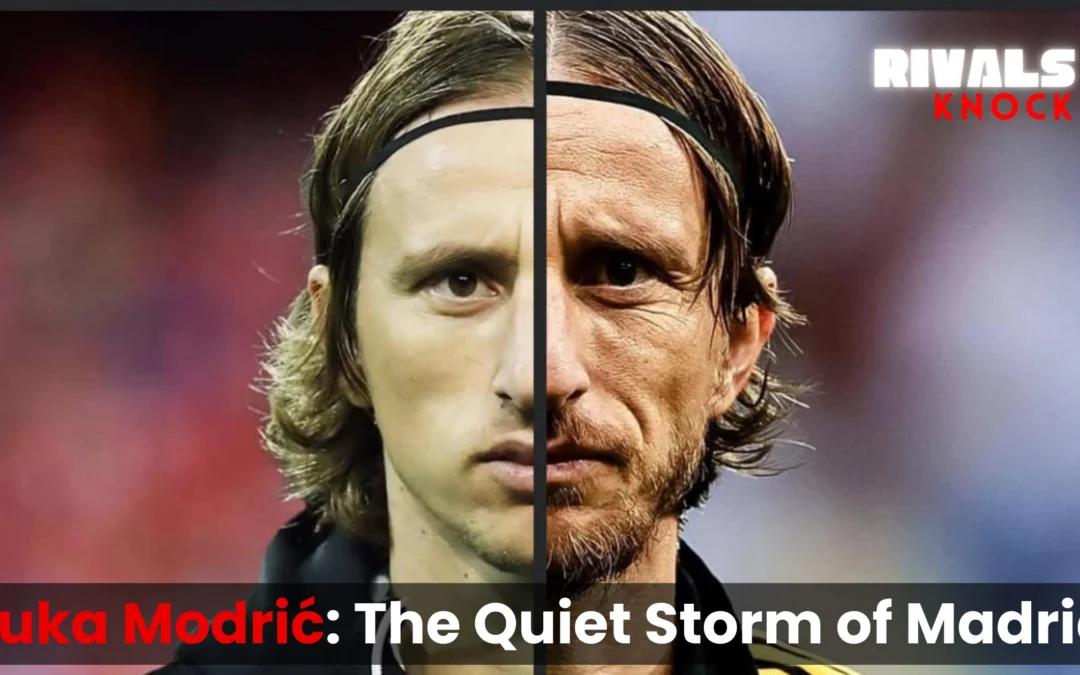In August 2012, Luka Modrić arrived at Real Madrid from Tottenham for €35 million—a 26-year-old Croatian with a wand of a left foot but a frame deemed “too lightweight” for La Liga’s cauldron. Spanish outlet Marca dubbed him the “worst signing of the season” in a fan poll, with 32.4% agreeing (Marca, December 2012). Under José Mourinho, Modrić struggled, starting just 19 La Liga matches in 2012/13, scoring 3 goals, and admitting he felt “lost” (The Guardian, March 2013). A 2-1 Champions League loss to Borussia Dortmund saw him substituted at halftime, the Bernabéu faithful murmuring doubts. Real Madrid finished 15 points behind Barcelona that season, and Modrić’s dream move seemed a nightmare. Yet, beneath the criticism, a quiet storm brewed. Rivals Knock revisits Modrić’s journey—a tale of resilience, magic, and defiance. From the doubters’ chorus to the Bernabéu’s heartbeat, Modrić’s 13 years in white would prove the naysayers wrong, etching his name among the legends of Real Madrid.
Moments of Magic: Turning Matches into Masterpieces
Luka Modrić rewrote history with moments that define greatness. In 2014, with the Champions League final against Atlético Madrid ticking into the 93rd minute, Modrić’s corner found Sergio Ramos’ forehead—a 1-1 equalizer that led to a 4-1 extra-time triumph, securing La Décima. His 92% pass accuracy that night was a glimpse of his genius. Fast forward to 2017: against Juventus in the Champions League final, Modrić orchestrated a 4-1 rout, assisting Ronaldo’s second goal with a pinpoint pass, completing 94% of his attempts. Zidane called him “the heartbeat”. Then, in 2022, facing elimination against Manchester City (4-3 down on aggregate), Modrić’s outside-of-the-boot pass in extra time found Rodrygo, sparking a 6-5 comeback. He played 120 minutes, and his 88% pass accuracy was a masterclass in control. Modrić’s magic wasn’t just flair—it was decisive, turning big matches into symphonies. His 2018 Ballon d’Or, after leading Croatia to the World Cup final and winning another Champions League, broke Messi and Ronaldo’s decade-long reign. For Madridistas, every Modrić touch—whether a croqueta past defenders or a curling pass—was a reminder: legends don’t just play; they create eternity.
Shadows of Setbacks: The Battles Behind the Glory
Even legends stumble, and Luka Modrić’s path wasn’t without shadows. His 2012/13 debut season was a trial—Real Madrid lagged 15 points behind Barcelona in La Liga, and a 4-2 Champions League semi-final loss to Borussia Dortmund stung, with Modrić substituted at halftime in the first leg. In 2014/15, a thigh injury sidelined him for four months, missing 16 matches; without him, Real Madrid crumbled, losing 4-0 to Atlético Madrid. The 2020/21 season tested his resilience—then 35, Modrić faced criticism for slowing down, starting only 28 La Liga matches as Real Madrid exited the Champions League against Chelsea (3-1 aggregate). “He’s past his prime,” some whispered, but Modrić’s response was a 2022 Champions League run that defied age, his passes sparking comebacks against PSG, Chelsea, and Manchester City. These setbacks—early doubts, injuries, and aging—only sharpened his resolve, proving that true greatness isn’t the absence of struggle, but the courage to rise above it. Modrić’s scars are as much a part of his legend as his trophies.
Road to Immortality: Proving the Critics Wrong
From “worst signing” to Bernabéu Legend, Luka Modrić’s journey is a testament to defiance. The 2013/14 season under Carlo Ancelotti marked his turning point—deployed as a deep-lying playmaker alongside Xabi Alonso and Ángel Di María, Modrić’s 92% pass accuracy and 2.5 key passes per game silenced doubters. By May 2025, he boasts 6 Champions Leagues, 5 La Liga titles, and 540 appearances with 39 goals and 85 assists. His 2018 Ballon d’Or, after a World Cup final run with Croatia, cemented his immortality. Modrić’s leadership shone off the pitch too—mentoring Federico Valverde and Eduardo Camavinga, earning praise as “our leader”. His croqueta, tempo control, and vision turned matches into art, from La Décima’s corner to 2022’s Manchester City miracle. “Luka proved everyone wrong. He’s our eternal maestro.” Modrić didn’t just win trophies; he won hearts, transforming skepticism into reverence. At Real Madrid, legends aren’t born—they’re forged, and Modrić’s fire burns brightest of all.
The Maestro at 40: Xabi’s Key to Big-Match Glory
At 40, Luka Modrić remains Real Madrid’s talisman. In 2024/25, he played 1,200 minutes, scoring 2 goals and providing 4 assists, his 89% pass accuracy a beacon of control. Xabi Alonso, Real Madrid’s new manager, knows his value: “Luka can change a game in an instant. We need him,” he said. With Modrić’s contract expiring in June 2025 and Al-Nassr circling (ESPN, May 2025), Alonso sees him as the key to big matches—his experience and composure vital against top sides like Manchester City or Bayern Munich in the 2025/26 Champions League. Imagine a semi-final: Modrić, off the bench, orchestrates a 2-1 comeback, his pass splitting defenses for Mbappé to score. Rivals Knock believes Modrić’s leadership—seen in his mentorship of Valverde and Camavinga—makes him indispensable.“Luka at 40 is still our king in clutch moments.” As long as Modrić wears white, Real Madrid can dream of glory. His magic endures, a reminder that true legends defy time.
Forever in White: A Legacy That Echoes
Luka Modrić’s legacy isn’t just 6 Champions Leagues or a Ballon d’Or—it’s the hope he ignites in every Madridista. From “worst signing” to eternal maestro, his 13 years at Real Madrid—540 appearances, 39 goals, 85 assists—rewrote history. What’s your favorite Modrić moment—La Décima’s corner, the 2022 Manchester City pass, or another? Can he deliver one last big-match miracle in 2025/26? Join the conversation on X with #ModricLegend and share your memories. Rivals Knock celebrates the quiet storm who turned doubt into destiny, proving greatness is forged in adversity. As Modrić’s time nears its end, let’s savor every flick, every pass, every heartbeat he gives to the crest. When he departs, we’ll whisper gracias—for the magic, the glory, the belief. Hala Madrid y nada más.

